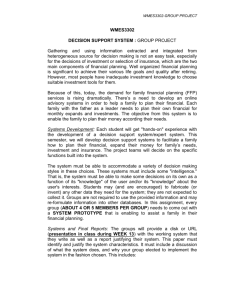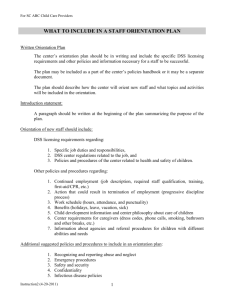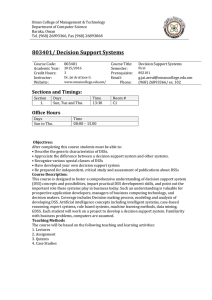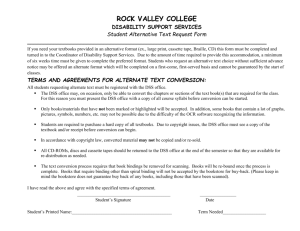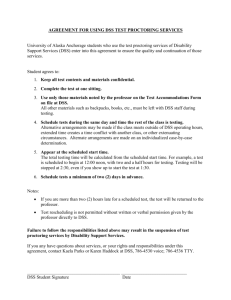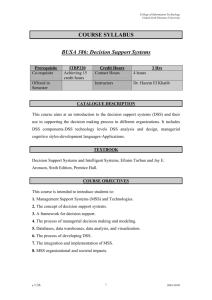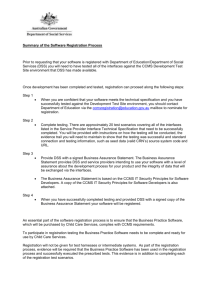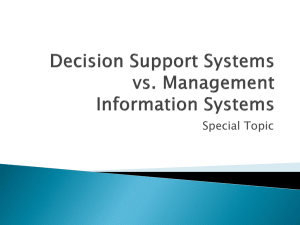STATEMENT OF LIEUTENANT GENERAL CHARLES J. CUNNINGHAM, USAF(Ret.)
advertisement
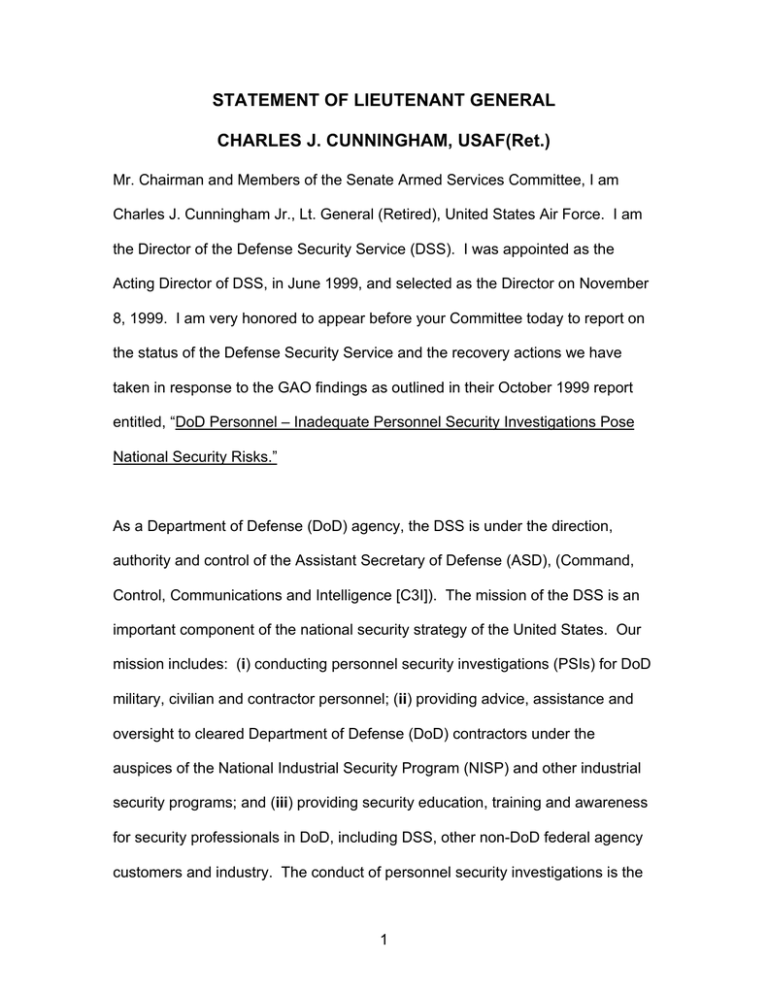
STATEMENT OF LIEUTENANT GENERAL CHARLES J. CUNNINGHAM, USAF(Ret.) Mr. Chairman and Members of the Senate Armed Services Committee, I am Charles J. Cunningham Jr., Lt. General (Retired), United States Air Force. I am the Director of the Defense Security Service (DSS). I was appointed as the Acting Director of DSS, in June 1999, and selected as the Director on November 8, 1999. I am very honored to appear before your Committee today to report on the status of the Defense Security Service and the recovery actions we have taken in response to the GAO findings as outlined in their October 1999 report entitled, “DoD Personnel – Inadequate Personnel Security Investigations Pose National Security Risks.” As a Department of Defense (DoD) agency, the DSS is under the direction, authority and control of the Assistant Secretary of Defense (ASD), (Command, Control, Communications and Intelligence [C3I]). The mission of the DSS is an important component of the national security strategy of the United States. Our mission includes: (i) conducting personnel security investigations (PSIs) for DoD military, civilian and contractor personnel; (ii) providing advice, assistance and oversight to cleared Department of Defense (DoD) contractors under the auspices of the National Industrial Security Program (NISP) and other industrial security programs; and (iii) providing security education, training and awareness for security professionals in DoD, including DSS, other non-DoD federal agency customers and industry. The conduct of personnel security investigations is the 1 largest of our three core mission areas and comprises approximately 83.4% of our total budget of $320 million for FY2000. DSS conducts PSIs in accordance with the National Standards established under Executive Order 12968 and the implementing guidance provided by the National Security Council. These investigations are conducted on individuals who require access to classified information or who will be assigned to sensitive positions. The eight DoD central adjudicative facilities (CAFs) use our investigations to determine if it is consistent with the interests of national security to: • Grant an individual access to classified information, • Determine if access to classified information should be continued, • Determine an individual’s eligibility for assignment to sensitive duties, and • Determine if an individual should be accepted or retained in the U.S. military. The scope of an investigation depends on the level of clearance or access an individual requires. A SECRET and CONFIDENTIAL clearance requires a National Agency Check, Local Agency Check, and a credit check (NACLC). A TOP SECRET clearance requires a Single Scope Background Investigation (SSBI) that, as a minimum, includes a National Agency Check; inquiries of law enforcement files; a credit or financial check; a review of appropriate education, employment, and other pertinent records; interviews of friends, coworkers, employers, neighbors, and other individuals, as appropriate; and an interview of the individual who is the subject of the investigation. Both the NACLC and the 2 SSBI may require expansion and additional field work depending on the information obtained during the investigation. DSS reports our findings in a Report for Adjudication so that DoD adjudicators have complete and accurate information on which to make an appropriate security determination. Mr. Chairman, with that as background, I would like to report on the recovery actions that we have taken in response to the GAO findings, and our own internal assessment. I would like to state that the Agency’s position is in full agreement with the findings and recommendations of the GAO, and we have regularly reported and coordinated our progress and recovery actions with both the GAO and the DoD Office of Inspector General (DoDIG). The DSS has made a commitment to correct the noted deficiencies and to go beyond the GAO recommendations to establish an organization known for its contributions to the national security of the United States by providing superior security products and services. Since I reported as the Acting Director of DSS in June of 1999, we have moved forward with a sense of urgency to fix the problems within DSS, with particular attention to the specific deficiencies in our PSI program identified by the GAO. I am very pleased to report to you today that we have made significant progress and are well on our road to complete recovery. First and foremost, I can assure you that the personnel security investigations currently conducted by DSS meet federal investigative standards. While a significant investigative backlog 3 remains, I can tell you that we are making progress and that we are on the verge of a significant breakthrough in reducing this backlog as we continue to implement the strategies that are outlined below. Let me begin by reporting on our recovery actions to date: 1. (GAO Recommendation #4): DSS should develop a corrective action plan as required under the Federal Manager’s Financial Integrity Act that incorporates corrective actions and milestones for addressing material weaknesses in the DSS personnel security investigative program and performance measures for monitoring the progress of corrective actions. DSS identified the Personnel Security Investigations Program as being a material weakness in its most recent submission of the Annual Statement of Assurance that was provided to the Office of the Secretary of Defense on November 15, 1999. In the corrective action plan that was submitted as part of this statement, the first seven milestones were reported as completed by November 15, 1999. Substantial progress has been made against the ten remaining FY 2000 milestones up to this point. As mentioned above, each action is reported on a regular basis as part of the GAO goals and objectives bi-monthly review, which is attended by me and representatives from the GAO and the DoDIG. DSS is 4 required to update the corrective plan and formally report on our status at the next annual assurance statement submission due by November 15, 2000. 2. (GAO Recommendation #7): DSS failed to comply with federal investigative standards. The GAO report outlined in some detail the deficiencies in DSS investigations as substantiated by their review of 530 randomly sampled Top Secret security clearance investigations and reinvestigations completed by DSS in January and February 1999. As reported by the GAO, 92% of these investigations were deficient in one or more of the nine investigative areas. Our review of existing internal operating procedures and instructions confirmed numerous instances of noncompliance with federal investigative standards. On August 16, 1999, pending a rewrite and republication of the DSS Personnel Security Investigations (PSI) Manual, internal guidance was promulgated to all DSS PSI personnel to ensure immediately that our investigations were conducted in accordance with these federal standards. On October 15, 1999, our PSI Manual was republished with appropriate guidance and revisions in accordance with federal investigative standards. In order to ensure appropriate implementation and an understanding of the federal standards, DSS also began conducting refresher training to all PSI investigative and case analyst personnel. Recognizing the importance of experienced and knowledgeable supervisors in the oversight of this process, we 5 began to train all PSI supervisors to reinforce their knowledge and understanding of federal investigative standards. This training will be completed by April 28, 2000. 3. (GAO Recommendation #9): DSS failed to ensure quality control mechanisms were in place to ensure high-quality investigations. The cornerstone of our quality management improvements is our newly established Standards and Quality (SQ) Directorate. This Directorate will instill quality management principles within DSS to ensure the competency and professionalism of all employees through appropriate training, management practices, and improved operational processes. Under the umbrella of SQ, a Standards and Evaluation Office will establish and maintain standards for technical competency and knowledge of program requirements. This office will conduct periodic or aperiodic evaluations of DSS employees in the investigative or industrial security professions to ensure their initial and continued program knowledge, technical competency and professionalism. There will be a documented history of each individual’s initial and periodic training and/or remedial training, as necessary. SQ will serve as a conduit for providing this information to the DSS Academy to ensure continuous improvement in training methodologies and core competency curricula. This office is expected to be fully staffed by April 23, 2000, and fully functional in May of this year. In response to GAO recommendation #8, SQ has already developed procedures to ensure all 6 clarifications and recommendations on federal investigative standards are fully coordinated with ASD(C3I) and brought before the Personnel Security Committee of the Security Policy Board (SPB). As part of this effort, the DSS Liaison to the SPB has been realigned under SQ to enhance and further the coordination process. An Operational Standards and Quality Council, comprised of the eight DoD CAFs, ASD(C3I) and DSS, has also been established and held its first meeting on October 12, 1999. Council meetings are held on at least a quarterly basis and provide a forum for mutual discussion and resolution of operational issues and concerns, and for referral of policy issues to the appropriate authority. Under SQ, a Quality Management (QM) office was also established in January 2000, after the appointment of a Quality Director in December 1999. The QM office will serve more broadly throughout the Agency by ensuring that the emphasis on quality is established at the outset of each process, thereby reducing the problems that might otherwise surface in an evaluation of the final product. Additional staffing of this office is underway, including military reservists with QM background and experience. A Quality Management Plan (QMP) is under development, with a projected completion date of June 1, 2000. Our initial emphasis in this process will be on the PSI program. 7 PSI field supervisors are currently conducting reviews of all completed field investigations to ensure the quality of our personnel security investigations. However, our desire is to build quality into our products and services, thereby reducing the requirement for back-end quality reviews. Therefore, DSS Regional Directors, in coordination with our Quality Management office, are developing procedures to ensure uniform application and appropriate quality reviews on a random sampling basis, or as otherwise deemed necessary. We are also developing a process that will provide us with timely, case-specific feedback from the adjudicator on the quality of our investigative product. These quality reviews will augment our overall quality efforts, which include providing appropriate training, continual professional development, and periodic reviews by our Standards and Evaluation employees. A methodology to collect data from our quality review process will also be developed to identify trends and to effect appropriate remedial action. I would briefly like to discuss quality management in the context of the DSS organizational and management structure. When I first arrived at DSS, I immediately noticed the low morale of the DSS workforce that was due, in part, to the organizational changes that had occurred in the prior 2-3 years, including a major downsizing of the workforce. Employees were afraid of losing their jobs or concerned about possible dissolution of the Agency. Productivity was at an alltime low because of problems with the recently deployed automated Case Control Management System (CCMS) and a general loss of confidence in 8 management decisions. If DSS was to move forward in resolving our problems and effectively accomplishing our mission, proper management of the workforce was essential. To that end we began to restructure the organization in order to reduce the supervisory span of control and to restore sound management practices and accountability. We began our reorganization at the headquarters level so as to minimize disruption and prevent further loss of productivity, and then moved down into our field level. The DSS reorganization has now been completed. Our field structure is comprised of four Regions (reduced from 13 Operating Locations) and program specific field offices to ensure that supervisors have program-specific knowledge and expertise. We have also reduced the supervisory span of control in our field offices from as much as 1:35 to an average of 1:12 to ensure adequate supervision. We believe this overall structure is more consistent and in alignment with other DoD organizations; is easily understood; and promotes operational consistency, effectiveness and quality assurance. Additionally, we are addressing other human resource issues that may be impediments or constraints to improved productivity. Our goal is to have a highly motivated, highly skilled, and professional workforce. To that end, we are currently working to improve internal communications, establish and implement regular and meaningful performance evaluations, ensure appropriate position descriptions, provide for appropriate incentives and compensation, ensure 9 promotion opportunities, and improve our recruitment program to ensure the hiring of qualified candidates. In accordance with the GAO recommendation #6, DSS is now conducting data analyses of our direct production occupations, that is, investigative personnel and case analysts. Our goal is to complete this analysis before final submission of the Program Objective Memorandum (POM) on May 19, 2000. These results will be used as the basis for estimating our future manpower requirements. In the meantime, we are continuing recruiting actions to hire additional agents, case analysts and other essential direct productive personnel. We currently have 1,197 Special Agents on board, which is up from 1,145 Special Agents in June of 1999. 4. (GAO Recommendation #10): DSS failed to provide adequate training for investigative and case analyst personnel. In 1997 the DoD Security Institute was disestablished, and responsibility for security education, training and awareness was transferred to an internal component of DSS headquarters. This situation not only had a negative impact on internal training requirements for DSS personnel, but also resulted in our failure to meet the security education, training and awareness requirements of our external customers. One of my most urgent recovery actions was to 10 reestablish this mission under a training academy. By July 1999, we had chartered the DSS Academy to provide an institutional focus for our internal and external customers. Since July we have focused our efforts on building a quality education and training infrastructure and on reinvigorating our security curriculum to meet customer requirements. We identified and contracted for 32,000 square feet of space to house Academy operations that will be collocated with our Standards and Quality organization. We expect great positive synergy from this organizational alignment, which allows for day-to-day interaction and cross-feed of the knowledge that will underpin DSS operations. On February 25, 2000, the DSS Academy took initial occupancy of our new classroom spaces and, on February 28th, we began our first class--a comprehensively restructured Basic DSS Agent course--in this new space. Buildout of the Academy facility continues with full occupancy expected in late May. The Academy will possess a sophisticated communications infrastructure to assure an ability to integrate and leverage the most current education and training technologies to enhance the effectiveness, quality and quantity of the Academy’s education, training and awareness products. The Academy is also expanding its staff, adding senior subject matter expertise in its key curriculum areas of Personnel, Industrial, and Information Security as well as the crosscutting areas of Counterintelligence and Information Systems Security. Additionally, DSS professional development resources have been integrated with the Academy organization to focus on management of the link 11 between education and training and the development of the DSS security professional. With these resources, the Academy is structuring a developmental curriculum that will be integrated with subject matter training at career progression phase points. Curriculum development has been the second major Academy thrust, with several major initiatives undertaken beginning in July 1999. The central activity has been the formal review and validation of all courses. Curriculum Stakeholder Panels composed of Academy, DSS, DoD and industry customers have been evaluating each Academy course offering. We expect to complete course validations for all external course offerings in the spring of this year. We have invested heavily in the revitalization of curriculum for the Agency’s core security professionals. We have designed new basic courses for both investigative and industrial security professionals. These courses focus both on core professional competencies and national standards. On March 24, 2000, we graduated our first class of new DSS Special Agents under the new curriculum and have scheduled three more classes -- two in April and one in August. We have also developed a structured mentoring program for Case Analysts and are planning a full residence course and curriculum. A redesigned basic course for Industrial Security Representatives will begin in June and continuing education programs are being planned for all disciplines. This year we will also increase emphasis on leveraging and integration of technology to support curriculum content and distribution. 12 Within the coming months, we will also begin to focus on the reestablishment of the security awareness program. This will begin with the hiring of a program manager who will be responsible for building the program. Emphasis will be on traditional security awareness products and on technology-based products to enhance their impact within the security community. 5. (GAO recommendations #6 and 11): DSS must take steps to correct the Case Control Management System (CCMS) and develop an overall strategy and resource plan for improving the quality and timeliness of investigations. The DSS has been through some very difficult times this past year. Significant workload increases, combined with crippling automation problems, have resulted in a negative impact on our customers, including the military departments, industry, and other non-DoD federal agency customers. To mitigate the impact on industry, we have put together a concentrated effort to issue interim clearances to industry in a more timely manner. (These interim clearances allow a contractor employee to have access to most classified information, thus eliminating the loss of productivity and permitting that individual to start work while waiting for a final clearance.) 13 The most significant management challenge has been achieving and maintaining the capacity to process all of the DoD military, civilian and defense contractor personnel security investigations, both current and past-due. The strategy we have undertaken to mitigate this challenge is two-fold: Stabilize, Improve and Enhance the CCMS and Selectively Augment the DSS Investigative Workforce to gain efficiencies nationwide. Deployment of CCMS in October 1998 had an extremely detrimental affect on DSS PSI processing times. The CCMS was originally designed to be a paperless system when used in conjunction with an Electronic Personnel Security Questionnaire (EPSQ) designed by DSS. However, customer use of the EPSQ at the time of deployment was below 50% and last-minute development of systems and processes to handle paper request forms were not compatible with the new system. These workaround systems and processes were deployed without proper testing and proved to be almost fatal to the system. CCMS was also deployed without a management reporting capability, with inadequate design documentation from contractors who designed the system, and with no inhouse technical expertise to manage the complex environment or perform the integration activities required for a successful system development and deployment. During 1999, three separate teams assessed the problems with CCMS. Their findings culminated in the decision to improve CCMS by forming an operational 14 partnership with the U.S. Air Force to create a Program Management Office (PMO). The PMO now oversees the day-to-day operations of the system, develops and integrates hardware and software patches and other system enhancements, and continually works toward increasing system capacity and case throughput. On January 10th, a PMO/DSS Gateway was established to facilitate a structured and disciplined interface for all action agreements, that is, one point of entry for all issues, changes, priorities, etc. A three-phase recovery plan for CCMS is presently on target. Phase I which includes system stabilization and short-term improvements is projected to end at the conclusion of this fiscal year, September 2000. The first phase will include establishing separate test, production and development environments. The test system has been procured, installed, and will become operational sometime during April 2000. Daily operational meetings with the PMO have offered a much needed forum for identifying and resolving system problems and all resources are focused on resolving many of the impediments in our front-end and back-end case processing that will greatly reduce our overall case processing times. Our goal is to stabilize the CCMS to support our daily output goal of 2,500 security products. We believe this goal is realistic and achievable as our trend analysis indicates continued increased output. Statistics show that our February output increased by 60% over January (current case closings are at 1,500 per day) and continues to improve. We are confident that we will reach our goal of 2,500 by September of this year, or earlier. 15 During the second phase, we will continue to improve system performance. This phase includes eliminating system bottlenecks, implementing DSS prioritized requirements, and improving response and status to system users. The third phase, which is expected to take place from June 2001 to June 2003, is our enhancement phase. During this final phase, we will reduce the manpower and system support resource requirements, implement periodic upgrades of systems and software, as necessary, maintain effective production, development and test environments and maintain high user confidence in the system and its capabilities. CCMS remains a management challenge; however, we have accomplished many improvements with positive results as demonstrated by our improved productivity. For example, we have reduced the time it takes to print a Report for Adjudication after an investigation is closed from 30 days to 2-4 days. We have also resolved a fingerprint processing problem by working with the FBI to secure fingerprint scanning machines that are directly linked to that organization. We now obtain responses to queries within 24 hours. The DSS has received additional funding in the amount of $47M for CCMS for FYs 1999 through 2005. Additional funding requirements beyond this period are unknown but are being evaluated. 16 Finally, by May 1, 2000, in coordination with the Assistant Secretary of Defense (C3I) and the Office of Program Analysis and Evaluation, I must provide the Deputy Secretary of Defense with a report and recommendation for keeping or replacing the CCMS. The Periodic Reinvestigations (PR) backlog within DoD has reached significant proportions, and is now estimated to be approximately 505,000. This backlog, which includes reinvestigations of DoD military and civilian personnel and contractors, has not yet been submitted to DSS for investigation. The backlog is not a recent phenomena but is, in part, the result of previously implemented policies that established quotas for the military components on the number of PRs that could be requested. These quotas were established to assist DSS in managing an increasing investigative workload, thus reducing case completion times. Policy changes in the scope and frequency of PRs and initial investigations have contributed to the difficulties we are now experiencing in completing timely investigations. Recent implementation of Executive Order 12968, which established new investigative requirements, resulted in additional field work over what was previously an automated process. Customer requirements, driven in part by an upsurge in information technology positions in government and industry, have resulted in an ever-increasing demand for investigations and clearances. The Deputy Secretary of Defense has directed that every effort be made by the military departments and industry to “scrub and prioritize” the backlog. 17 The DSS budgeted investigative caseload for FY00 is 16% higher than was anticipated in last year’s President’s Budget. This increase is expected to grow by another 5% in FY01, followed by more modest increases in the outyear projections. Early in June 1999, we recognized that additional resources would be required to manage effectively the workload and eliminate the PR backlog. We planned and initiated a two-phased approach to outsourcing some of our investigative workload. Phase I of our plan was immediately implemented through the release of two letter contracts to investigative providers in order to augment our DSS workforce. Additionally, we established a program for augmenting our workforce with military reservists with investigative experience. We currently have 52 reserve personnel augmenting our investigative workforce. DSS has budgeted approximately $4.0M to support reserve activities in FY 2000. We intend to expand our reserve program by bringing additional reservists on board as investigators. We are also in the process of establishing a drilling Reserve program at DSS that will consist of identifying reservists to support DSS during their normal drill activities. Our five-year plan is to have 48 full-time equivalents (FTEs) serving the agency, which equates to 360 drilling reservists. When fully operational, our drilling reserve unit, augmented by individual reservists on extended active duty tours, will provide us with a cost effective, flexible and 18 highly trained workforce that we can use as necessary to meet changing or surging workload requirements. Phase II of our augmentation plan includes obtaining “end-to-end” contractors. A directed RFP to four private firms was issued on February 26, 2000. Through this effort, it is anticipated that we can direct 80,000–100,000 investigative cases to contractors. These investigations will be independently completed and managed by each contractor, thereby bypassing the processing of these cases through CCMS. Our plan includes directing only low-risk cases to these end-toend contractors with DSS retaining the “high-risk” or “significant” cases. A predictive model to identify those cases that pose a higher risk based on responses to certain questions on the personnel security questionnaire (PSQ) has been developed and will be used at the front end of our processing to determine which cases may be “high risk,” thus providing a mechanism for prioritizing and routing our investigations. The award of these contracts is imminent. It is extremely important to note that each contractor under DSS oversight will be required to maintain the same investigative standards and quality as are applied within DSS. Lastly, in a memorandum dated September 19, 1999, the ASD (C3I), mandated that all investigations for DoD civilian personnel, except for overseas investigations, would be conducted by the Office of Personnel Management until 19 such time the PR backlog is eliminated. This is a temporary measure that will provide interim relief to an overburdened CCMS. 6. (GAO Recommendation #5): DSS should establish a strategic plan that includes agency goals and performance measure. DSS is pleased to report that we are fully compliant with the GAO’s recommendation to establish a strategic plan in accordance with the Government Performance and Results Act. The DSS FY 2000-2005 Strategic Plan was recently completed and promulgated and is available for the Committee’s review upon request. The plan outlines our goals, objectives, vision and values, and explains how DSS will maintain a strategic focus on day-to-day activities. Our performance plan is currently under development and quarterly performance reviews have begun. Revitalization of the industrial Security Program (Joint Security Recommendation #20): The problems plaguing the PSI program in the past few years have, to a great extent, resulted in inattention to the industrial security program. Within the past year, we have refocused our attention on the challenges we face in administering this program. Everyone is well aware of the rapid technological developments and increased globalization that have resulted in more diverse and complex 20 threats to our nation’s sensitive information and technologies. All of these rapid changes have significantly impacted both the scope and complexity of our industrial security mission. The use of automated information systems (AIS) now require that our industrial security representatives (IS Reps) possess or acquire a new set of skills, knowledge and technical expertise. Our IS Reps must also possess an understanding of the complexities of the new business environment brought about by increased globalization that has resulted in partnerships and mergers with foreign industry. DSS has been sharply criticized over the past several years for neglecting our responsibilities for oversight of defense contractors and for focusing instead on advice and assistance visits that were at best aperiodic or event driven. In 1998, the Information Security Oversight Office (ISOO) indicated that many cleared contractor facilities had not been visited by DSS IS Reps for several years, and strongly encouraged that we place more emphasis on security reviews. One of the most difficult problems has been in managing this program. A previously developed automated industrial security system that was designed to assist in managing this program was not fixed due to more pressing problems with CCMS and, except for certain portions of the system which are still in use today, the system generally became unusable. 21 In September 1999, I directed a study (i) to develop recommendations for improving our administration of the ISP, and (ii) to determine the feasibility of augmenting our IS Rep workforce with outside resources. That study has been completed and has resulted in several excellent recommendations that we believe will effectively address many of the difficult issues we face in the ISP. They include: ♦ Development of a new automated National Industrial Security System. A Concept of Operations has already been prepared that, as proposed, provides for a system that would provide industry and government customers the ability to input and access relevant information, and for DSS to extract and evaluate this information. More importantly, this information, which would be available through the database, would “prompt” the required IS Rep actions. The system will not replace normal IS Rep on-site security reviews; however, it would provide a mechanism for prioritizing our based upon the potential or reported vulnerabilities and threats to classified information. As a potential “force multiplier” for DSS, the system would be linked to other government databases that would contribute to a thorough industrial security review. We are in the initial stages of working design and procurement of this system through the planning, programming and budgeting system. ♦ Use of contractor support to augment IS Rep resources, particularly in the AIS security area. One of our greatest challenges is attracting and 22 maintaining AIS specialists in this highly competitive environment where information specialists can command much higher salaries within industry. To counter this reality, we believe that augmentation of our AIS and IS Rep specialists with experts from the private sector will significantly improve our capability to provide the necessary expertise in certain highly specialized fields such as telecommunications, platforms and operating systems. We are proceeding to work this recommendation through our Acquisition and Augmentation Office to establish a pilot program for this effort prior to full implementation. ♦ Providing specific operational guidance to IS Reps, particularly on international security issues. Our IS Rep Handbook is being replaced by an Operating Manual that will provide comprehensive guidance in all industrial security disciplines. This Manual is now in coordination with the IS Field Office Chiefs and will be published the week of April 26th. A field training effort will begin in June 2000. ♦ Developing a training course that meets the needs of IS Reps and security officers in industry. Our industrial security program office is working with the DSS Academy to review and revise, as necessary, the curriculum for both internal and external customers. There is a high demand for the Facility Security Officer (FSO) Program Management Course and training alternatives are being considered, such as computer and web-based training. 23 We believe that our reorganization to program specific field offices will greatly benefit the management and internal oversight of this program. Additionally, significant improvements in industrial security program performance are expected during FY 2000 as our standards and evaluation and training programs are implemented. By the close of FY 2000, the percentage of DSS’ completed security reviews will be at 80 percent of those required, up from approximately 60 percent 1 ½ years ago. As of December 1999, DSS had completed approximately 76 percent of the required security reviews of cleared defense industry, within the preceding twelve months. In addition, DSS is currently in the process of recruitment efforts to hire 40 additional IS Reps prior to FY 2001. With these new hires on board and trained, DSS will be conducting 95 to 100 percent of required security reviews of cleared defense industry by the end of FY 2001. We have a capable and motivated cadre of industrial security representatives who, with additional training and professional development, will be better equipped to meet the security demands of our customers. I am confident that the effectiveness of our industrial security program will improve as sound management and leadership practices are implemented. While I have reported on many of the challenges confronting us, I would like to bring to your attention the integration of counterintelligence knowledge and 24 threat awareness into our Agency’s core mission areas. In 1994, DSS created a CI office to work with our investigative and industrial security professionals to imbed CI principles into our security products and services. We believe that this effort has significantly enhanced the value of our investigative products as our investigative workforce has been trained to identify potential espionage “indicators” as they conduct background investigations. The CI office also works closely with our IS Reps in providing appropriate threat information to cleared contractors, thereby increasing industry’s recognition and reporting of foreign collection attempts and industry’s ability to establish threat-appropriate security countermeasures to further protect classified information. CI is also an integral part of our training, education and awareness mission, with CI personnel serving as adjunct instructors in the DSS Academy. DSS has recently completed several procedural and technical improvements that will enhance the services provided by our CI office to our security workforce. For example, major improvements have been made in our automation capabilities, in particular with respect to accessing U.S. CI and Intelligence Community databases. CONCLUSIONS: 25 Mr. Chairman, improving productivity and quality are no longer matters for debate at DSS. Our organization’s future success will be determined by how well and how quickly we improve our work processes. One tool we are using to meet this new reality is benchmarking. Benchmarking techniques were used in the stand up of our Standards and Quality and Augmentation and Acquisition Directorates. Our goal is to model our organization after the best in the business. Similar ongoing benchmarking efforts now include forming a strategic alliance with the Office of Personnel Management and a private entity to improve our CCMS and our customer identification and liaison processes. We are also teaming with other DoD agencies to refine and streamline our time and attendance reporting process, which in turn will help us more accurately determine the cost of investigations and identify major cost drivers within our Agency. We continue to move forward in a still-challenging environment, but we are now much more confident in our future success. The employees of DSS understand the importance of our mission to national security and they stand ready, willing and able to accomplish our mission. One of the hallmarks of our Agency has always been our cadre of hardworking, dedicated professional employees who have made great personal sacrifices to work against overwhelming adversities. With continuing training, professional 26 development and implementation of quality management, I am confident that we will soon have an organization with unparalleled expertise. I expect complete and full recovery of the CCMS, with continuous improvements in productivity. The employees of DSS understand that productivity is measured most clearly in the form of quality and timely Reports for Adjudication, which we provide to the DoD CAFs. I feel very privileged to be the Director of DSS. I can assure you that we are moving in the right direction to improve our productivity and that the quality of our investigations—and all of our security products and services—will not be compromised. This concludes my statement on the status of DSS and the findings of the GAO. I appreciate the opportunity to appear before this Committee to discuss our recovery actions and the challenges that still lay before us. Again, I am confident that the changes we have already effected and those that remain to be implemented will result in the full recovery of DSS. I pledge to you that DSS will rise to this challenge. 27
